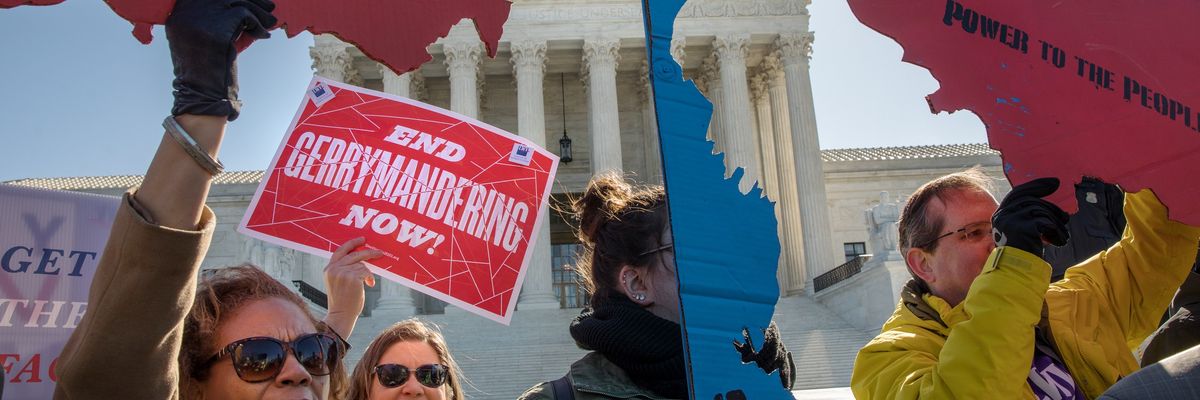
Demonstrators protest against gerrymandering at a rally at the Supreme Court.
Looking to End '12 Years of Rule by Right-Wing Interests,' Groups Challenge Wisconsin Maps
"In the past 12 years, one political party captured the Legislature and has insulated itself from being answerable to the voters."
Voting rights organizations and law firms joined forces Wednesday to file a legal challenge against Wisconsin's aggressively gerrymandered state legislative maps, which have allowed Republicans to cling to power in the Assembly and Senate for more than a decade.
Filed by Campaign Legal Center (CLC), Law Forward, the Election Law Clinic at Harvard Law School, Stafford Rosenbaum LLP, and Arnold & Porter, the petition argues that "Wisconsin's current legislative districts are unconstitutional in multiple ways," intentionally fragmenting Democratic voters in mid-sized cities and towns and giving Republicans an unlawful advantage.
The state's maps haven't changed much since 2011, when Republican lawmakers crafted GOP-friendly districts under then-Gov. Scott Walker.
"They are extreme partisan gerrymanders that violate multiple provisions of the Wisconsin Constitution," reads the new lawsuit, which was filed directly with the state Supreme Court. "The maps violate the Constitution's guarantee of equal protection because the Legislature, through these maps, has created superior and inferior classes of voters based on viewpoint, subordinating one class to the abusive fiat of the other. The maps also violate the constitutional guarantee of free speech because they retaliate against voters who express a political view by stripping them of political power."
The groups filed the challenge on behalf of 19 Wisconsin voters a day after liberal Justice Janet Protasiewicz was sworn in to the state Supreme Court, ending 15 years of conservative dominance. Protasiewicz criticized Wisconsin's maps as "unfair" during her campaign for the seat—the most expensive judicial race in U.S. history.
Jeff Mandell, a partner at Stafford Rosenbaum and board president of Law Forward, said Wednesday that "in the past 12 years, one political party captured the Legislature and has insulated itself from being answerable to the voters."
"Despite the fact that our legislative branch is meant to be the most directly representative of the people, the gerrymandered maps have divided our communities, preventing fair representation," said Mandell. "This has eroded confidence in our political system, suppressed competitive elections, skewed policy outcomes, and undermined democratic representation."
"We have endured 12 years of rule by right-wing interests," Mandell added, "and the voters of Wisconsin deserve fair representation."
"Legislators have no right to complete a term of office that was unconstitutionally obtained."
After a legal battle last year, the Wisconsin Supreme Court implemented Republican-drawn voting maps that Democratic Gov. Tony Evers vetoed in late 2021. Wisconsin's Republican-controlled Legislature tried and failed to override the governor's veto.
The new lawsuit argues that by imposing on the state the exact maps Evers vetoed, the Wisconsin Supreme Court violated the separation-of-powers principle.
The petition notes that the maps "did precisely what Republicans hoped" in 2022, "increasing their majority to 64 assembly seats (two shy of a veto-proof two-thirds majority) and 22 senate seats (a veto-proof majority)."
"An equally divided electorate yielded near two-third majorities for Republicans in both chambers," the petition adds.
The plaintiffs ask that the state's current legislative maps be redrawn and call for special elections for state Senate seats that would otherwise not be up for reelection until 2026. If the lawsuit succeeds, state Assembly races would also be held under newly drawn maps.
"The legislators elected in November 2022 took office in unconstitutionally configured districts," the lawsuit states. "That constitutional infirmity has persisted for over a decade now, and Wisconsinites have suffered under this unconstitutional system for long enough. Legislators have no right to complete a term of office that was unconstitutionally obtained."
Mark Gaber, senior director of redistricting at Campaign Legal Center, said Wednesday that "for far too long, Wisconsinites have had their voices illegally silenced by extreme gerrymandering."
"Gerrymandering is a stain on our democracy no matter which party does it," said Gaber. "It's common sense: Voters should pick their politicians, not the other way around."
An Urgent Message From Our Co-Founder
Dear Common Dreams reader, The U.S. is on a fast track to authoritarianism like nothing I've ever seen. Meanwhile, corporate news outlets are utterly capitulating to Trump, twisting their coverage to avoid drawing his ire while lining up to stuff cash in his pockets. That's why I believe that Common Dreams is doing the best and most consequential reporting that we've ever done. Our small but mighty team is a progressive reporting powerhouse, covering the news every day that the corporate media never will. Our mission has always been simple: To inform. To inspire. And to ignite change for the common good. Now here's the key piece that I want all our readers to understand: None of this would be possible without your financial support. That's not just some fundraising cliche. It's the absolute and literal truth. We don't accept corporate advertising and never will. We don't have a paywall because we don't think people should be blocked from critical news based on their ability to pay. Everything we do is funded by the donations of readers like you. Will you donate now to help power the nonprofit, independent reporting of Common Dreams? Thank you for being a vital member of our community. Together, we can keep independent journalism alive when it’s needed most. - Craig Brown, Co-founder |
Voting rights organizations and law firms joined forces Wednesday to file a legal challenge against Wisconsin's aggressively gerrymandered state legislative maps, which have allowed Republicans to cling to power in the Assembly and Senate for more than a decade.
Filed by Campaign Legal Center (CLC), Law Forward, the Election Law Clinic at Harvard Law School, Stafford Rosenbaum LLP, and Arnold & Porter, the petition argues that "Wisconsin's current legislative districts are unconstitutional in multiple ways," intentionally fragmenting Democratic voters in mid-sized cities and towns and giving Republicans an unlawful advantage.
The state's maps haven't changed much since 2011, when Republican lawmakers crafted GOP-friendly districts under then-Gov. Scott Walker.
"They are extreme partisan gerrymanders that violate multiple provisions of the Wisconsin Constitution," reads the new lawsuit, which was filed directly with the state Supreme Court. "The maps violate the Constitution's guarantee of equal protection because the Legislature, through these maps, has created superior and inferior classes of voters based on viewpoint, subordinating one class to the abusive fiat of the other. The maps also violate the constitutional guarantee of free speech because they retaliate against voters who express a political view by stripping them of political power."
The groups filed the challenge on behalf of 19 Wisconsin voters a day after liberal Justice Janet Protasiewicz was sworn in to the state Supreme Court, ending 15 years of conservative dominance. Protasiewicz criticized Wisconsin's maps as "unfair" during her campaign for the seat—the most expensive judicial race in U.S. history.
Jeff Mandell, a partner at Stafford Rosenbaum and board president of Law Forward, said Wednesday that "in the past 12 years, one political party captured the Legislature and has insulated itself from being answerable to the voters."
"Despite the fact that our legislative branch is meant to be the most directly representative of the people, the gerrymandered maps have divided our communities, preventing fair representation," said Mandell. "This has eroded confidence in our political system, suppressed competitive elections, skewed policy outcomes, and undermined democratic representation."
"We have endured 12 years of rule by right-wing interests," Mandell added, "and the voters of Wisconsin deserve fair representation."
"Legislators have no right to complete a term of office that was unconstitutionally obtained."
After a legal battle last year, the Wisconsin Supreme Court implemented Republican-drawn voting maps that Democratic Gov. Tony Evers vetoed in late 2021. Wisconsin's Republican-controlled Legislature tried and failed to override the governor's veto.
The new lawsuit argues that by imposing on the state the exact maps Evers vetoed, the Wisconsin Supreme Court violated the separation-of-powers principle.
The petition notes that the maps "did precisely what Republicans hoped" in 2022, "increasing their majority to 64 assembly seats (two shy of a veto-proof two-thirds majority) and 22 senate seats (a veto-proof majority)."
"An equally divided electorate yielded near two-third majorities for Republicans in both chambers," the petition adds.
The plaintiffs ask that the state's current legislative maps be redrawn and call for special elections for state Senate seats that would otherwise not be up for reelection until 2026. If the lawsuit succeeds, state Assembly races would also be held under newly drawn maps.
"The legislators elected in November 2022 took office in unconstitutionally configured districts," the lawsuit states. "That constitutional infirmity has persisted for over a decade now, and Wisconsinites have suffered under this unconstitutional system for long enough. Legislators have no right to complete a term of office that was unconstitutionally obtained."
Mark Gaber, senior director of redistricting at Campaign Legal Center, said Wednesday that "for far too long, Wisconsinites have had their voices illegally silenced by extreme gerrymandering."
"Gerrymandering is a stain on our democracy no matter which party does it," said Gaber. "It's common sense: Voters should pick their politicians, not the other way around."
Voting rights organizations and law firms joined forces Wednesday to file a legal challenge against Wisconsin's aggressively gerrymandered state legislative maps, which have allowed Republicans to cling to power in the Assembly and Senate for more than a decade.
Filed by Campaign Legal Center (CLC), Law Forward, the Election Law Clinic at Harvard Law School, Stafford Rosenbaum LLP, and Arnold & Porter, the petition argues that "Wisconsin's current legislative districts are unconstitutional in multiple ways," intentionally fragmenting Democratic voters in mid-sized cities and towns and giving Republicans an unlawful advantage.
The state's maps haven't changed much since 2011, when Republican lawmakers crafted GOP-friendly districts under then-Gov. Scott Walker.
"They are extreme partisan gerrymanders that violate multiple provisions of the Wisconsin Constitution," reads the new lawsuit, which was filed directly with the state Supreme Court. "The maps violate the Constitution's guarantee of equal protection because the Legislature, through these maps, has created superior and inferior classes of voters based on viewpoint, subordinating one class to the abusive fiat of the other. The maps also violate the constitutional guarantee of free speech because they retaliate against voters who express a political view by stripping them of political power."
The groups filed the challenge on behalf of 19 Wisconsin voters a day after liberal Justice Janet Protasiewicz was sworn in to the state Supreme Court, ending 15 years of conservative dominance. Protasiewicz criticized Wisconsin's maps as "unfair" during her campaign for the seat—the most expensive judicial race in U.S. history.
Jeff Mandell, a partner at Stafford Rosenbaum and board president of Law Forward, said Wednesday that "in the past 12 years, one political party captured the Legislature and has insulated itself from being answerable to the voters."
"Despite the fact that our legislative branch is meant to be the most directly representative of the people, the gerrymandered maps have divided our communities, preventing fair representation," said Mandell. "This has eroded confidence in our political system, suppressed competitive elections, skewed policy outcomes, and undermined democratic representation."
"We have endured 12 years of rule by right-wing interests," Mandell added, "and the voters of Wisconsin deserve fair representation."
"Legislators have no right to complete a term of office that was unconstitutionally obtained."
After a legal battle last year, the Wisconsin Supreme Court implemented Republican-drawn voting maps that Democratic Gov. Tony Evers vetoed in late 2021. Wisconsin's Republican-controlled Legislature tried and failed to override the governor's veto.
The new lawsuit argues that by imposing on the state the exact maps Evers vetoed, the Wisconsin Supreme Court violated the separation-of-powers principle.
The petition notes that the maps "did precisely what Republicans hoped" in 2022, "increasing their majority to 64 assembly seats (two shy of a veto-proof two-thirds majority) and 22 senate seats (a veto-proof majority)."
"An equally divided electorate yielded near two-third majorities for Republicans in both chambers," the petition adds.
The plaintiffs ask that the state's current legislative maps be redrawn and call for special elections for state Senate seats that would otherwise not be up for reelection until 2026. If the lawsuit succeeds, state Assembly races would also be held under newly drawn maps.
"The legislators elected in November 2022 took office in unconstitutionally configured districts," the lawsuit states. "That constitutional infirmity has persisted for over a decade now, and Wisconsinites have suffered under this unconstitutional system for long enough. Legislators have no right to complete a term of office that was unconstitutionally obtained."
Mark Gaber, senior director of redistricting at Campaign Legal Center, said Wednesday that "for far too long, Wisconsinites have had their voices illegally silenced by extreme gerrymandering."
"Gerrymandering is a stain on our democracy no matter which party does it," said Gaber. "It's common sense: Voters should pick their politicians, not the other way around."

